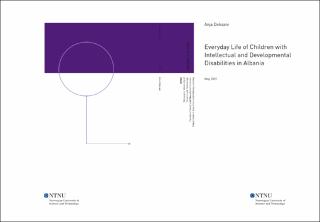| dc.description.abstract | The focus of this master's thesis is children with Intellectual and Developmental Disabilities (IDDs) in Albania. It is exploratory research about the everyday lives and personal experiences of childhood and disability. The research took place in a private multi-functional daycare centre in Tirana. The primary participants were children with IDDs whereas the secondary participants were their parents, teacher and therapist who worked with them in the centre.
This research draws on theories, concepts and models from interdisciplinary fields of research including childhood studies, disability studies, disabled children's childhood studies and intersectionality theory. The central value that guided the data collection process and analysis is the acknowledgement that children with IDDs are participants and active agents worthy of contributing to the co-creation of knowledge about their own lives. Utilising the mosaic approach and inspired by ethnographic and participatory methodology, I designed an inclusive, child-focused methodology for this research. I conducted participatory observation and activity-based interviews with the children, as well as semi-structured interviews with parents and professionals.
The main contribution of this research is that it reveals the social construction of childhood disability by painting a more nuanced picture of the uniqueness of the experience of the participants' lives at the intersection of age, ability, gender, culture and socio-economic status. The findings of the study are threefold. First, whereas children with IDDs are very different from one another, they experience some similar challenges and share some basic needs. They enjoy going to school and being included in regular classrooms which allows them to make friends and socialise. However, they often struggle with receiving quality and consistent education that matches their lived realities. Second, the issues present in the healthcare services should be improved to comply with the demands stipulated by law. Raising a child with disabilities is a joyful and extraordinary experience but it is also difficult at times and presents many challenges for families. Caring for children with IDDs in Albania is influenced by the family's support from their relatives, their economic status, the geographic location and proximity to services and many other factors. Third, oftentimes children with IDDs become targets of stigma and prejudice based on a construction of disability as a 'misfortune' or problem informed by the normalcy and development paradigm. These findings have important social policy implications for supporting families and children with IDDs in Albania and beyond. | |
